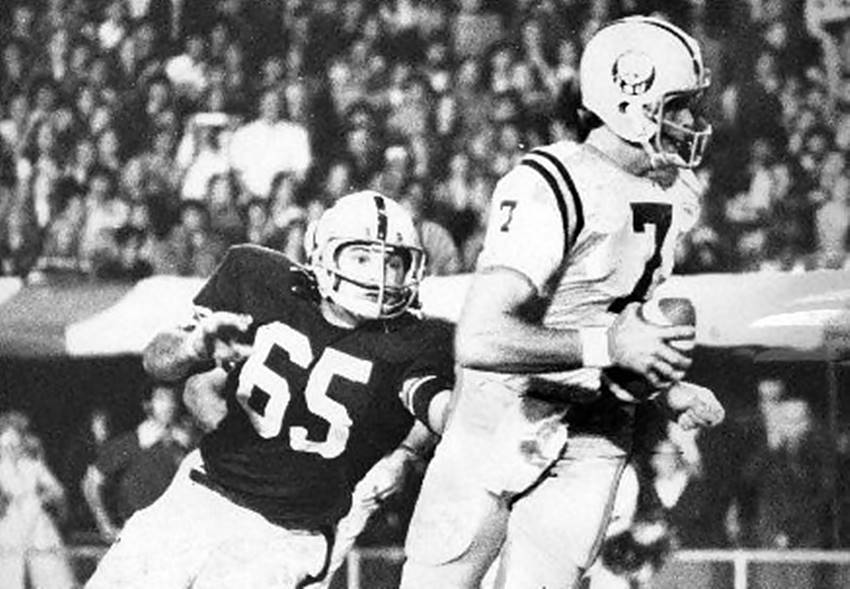Tulane legend Mark Olivari blessed with many memorable influences

Mark Olivari starred at Tulane from 1972 to 1975, twice earning All South Independent honors and also setting a school record with 14 sacks in 1973. He was inducted into the Green Wave Hall of Fame in 1992.
The local product has an interesting backstory.
Born in Japan, Olivari resided in Argentina until his family moved to the New Orleans area when he was seven-years old. He almost went to LSU, wanted a career in baseball and did not want to play defensive line. He was blessed with quality coaches and comrades who helped shape him.
Charlie Rosevalley, coach of the Carrollton Boosters 11-12 year old team at the time, was instrumental molding young Mark during his pre-teen years. Olivari’s first love was in sports came playing catcher, but he lacked elite hitting skills.
Another big influencer for Mark was Firmin Simms, who spent 46 years in NORD and a quarter century as National Director for Biddy Basketball. “An incredible man,” Olivari recalls.” A man of God.”
As a prepster, Olivari crossed paths at Jesuit with legendary coach Kevin Trower, a gentleman who possessed outstanding coaching acumen.
“Coach Trower had immense knowledge and passion throughout six decades of coaching,” Olivari said. “Amazing mind, very cerebral, methodical. A lot like Tom Landry (legendary Dallas Cowboys coach).”
Olivari has always been obsessed with fitness. Phil Foto, the former New Orleans city attorney and assistant district attorney to Jim Garrison, was a big influence in that department.
“He was my mentor, a true warrior,” Olivari said. “He gave me so much confidence. A God-fearing gentleman who was an avid workout warrior.”
In his early days at Jesuit, Olivari yearned to play baseball. In fact, he had never played football. He received some advice from the Blue Jays head football coach Ray Coates that would change his life. Coates was a former LSU halfback who played for the New York Giants in the late 1940’s. He recognized a unique skills possessed by the 6-foot, 190-pound ball of energy.
“I was playing linebacker,” Olivari said. “I enjoyed hitting. We were facing Redemptorist early in 1969 season. Coates said, ‘Hey boy, you know what you’re going to do for me ? You’re going to play nose guard. You’ll have the greatest time of your life. You’re going to think you’re stealing candy from a baby.’ It blew my mind. I supplanted a team captain. Coates let me stunt on every play. It was like putting a defensive back on the line from that time on.”
Tragedy struck during the summer of 1970. Mark’s older brother Alex, a year and half his senior, was on a diving expedition in the Gulf of Mexico. Alex was an honor student at De La Salle. He disappeared in the Gulf of Mexico and his body was never recovered.
Olivari befriended Steve Foley while in the fourth grade at Incarnate Word and later at St. Rita’s.
“Steve told my mother that he will be by my side, that we will be best friends until we die. Steve Foley walks on water in my eyes,” Olivari said.
They would go onto be teammates at Jesuit and later at Tulane. Foley, who spent 11 NFL seasons in Denver, is still the Broncos’ career record holder with 44 interceptions.
As a young athlete, Mark greatly admired LSU linebacker George Bevan, an All-American. Olivari was on the sideline for LSU’s 28-8 triumph over Notre Dame in 1971. He loved the environment of Tiger Stadium, but head coach Charlie McClendon expected an early decision to commit to the Tigers. Olivari wanted to consider other options.
“Coach Mac came to my physics class and said, ‘you have to be an opening day signee or we won’t take you.’ The experience on the sideline for the Notre Dame game was phenomenal. I thought that LSU was for me.”
However, Olivari eventually followed brothers Steve, Rob and Mike Foley to Tulane.
Tony Misita was Tulane’s defensive line coach, and Marv Hagaman was the defensive coordinator.
The 1973 Tulane squad was special. The defense recorded three shutouts and allowed 13.3 points per outing.
Opponents referred to Olivari as ‘the midget in the middle’. Tulane hosted Boston College in the season opener. Eagles center Steve Corbett would later go onto play for the New England Patriots. He looked at Mark laughing and said, “You’re not going to be playing here all night?”
Boston College had demolished Temple 45-0 the previous week.
Following the third play of the contest, Olivari retorted, “Corbett, before tonight is over, you’re going to say a Novena. You will always try to forget this game because it’s going to be embarrassing.”
Tulane prevailed 21-16.
“Opening day (Sept. 22, 1973) was hot and humid,” Olivari said. “Chestnut Hill did not prepare the BC players . It gave us so much confidence.”
Three weeks later, Tulane traveled to Duke and came away victorious, 24-17.
“I played my best game,” Olivari recalled. “I faced center Billy Bryan. I kept flushing the quarterback out of the pocket. Charlie Hall earned AP lineman of the week.”
Bryan would later become a teammate of Foley’s in Denver. He told Steve that Olivari could have suited up in the NFL.
North Carolina would represent the fifth victory in a six-game consecutive winning streak in begin 1973. The Wave shut out the Tar Heels, 16-0. Olivari earned UPI player of the week acclaim after recording two sacks and recovering a fumble.
“I didn’t get recognized against Duke, but felt I made more things happen against them,” Olivari said. “Against North Carolina things came my way.”
Heading into the December 1, 1973 matchup versus LSU, the Tigers were sporting an 9-1 record and headed to the Orange Bowl. Tulane was 8-2 and had revenge on their mind. LSU had won a tight 9-3 decision the year prior.
Olivari manned the middle of the Wave defense against LSU center Jimmy Oustalet and guards Tyler LaFauci and Logan Killen. Mark made back-to-back big plays that defined the night for the Wave.
“LSU was driving, and we were leading 14-0,” Olivari said. “It was third-and-eight in the third quarter. Mike Miley kept going on the exact same snap count. It was like setting up the Tulane defensive line with a starter’s pistol. I listened to his voice inflection. I shot the gap and tackled Miley for a nine-yard loss. Then their kicker Juan Roca attempted a 49-yard field goal. I got a hand on it. The kick failed. That broke their backs.”
In another memorable performance, Tulane came up short, 30-22, in Nashville against Vanderbilt in 1974 but not because of Olivari.
He recorded 22 tackles, 14 unassisted, and earned the respect of the Commodores.
“I was so amped up,” Olivari said. “Their coach Steve Sloan told me, ‘son, you played a helluva game. You played angry.’ He was a Christian man. He wrote me a long letter later.”
Olivari not only excelled as a hell-bent-for-leather defensive player, but he tried his hand at placekicking.
As usual, Mark was good.
He converted on a 48-yarder against Kentucky in Lexington and nailed 52 and 54-yard attempts in a heartbreaking 13-12 loss to Air Force during the 1975 season. Bennie Ellender let him try a 72-yarder at Tulane Stadium that was not successful.
Olivari put a bow on his career with a tryout at linebacker with the Pittsburgh Steelers in 1979.
“I got to know (center) Mike Webster very well,” Olivari said. “My locker was next to Jack Lambert and Dirt Winston. Woody Woodenhofer was the linebackers coach. It was a Steelers team consisting of 11 Pro Football Hall of Fame inductees with a a Hall of Fame coach in Chuck Noll. They captured their last of four Super Bowl wins in the decade later that season.”
Mark had a prankster side.
He snuck into the Tulane locker room the night prior to the season finale and pilfered good friend Mackie Shilstone’s game jersey from his locker, brought it to a local Sporting goods store and had “Super Fly” stenciled on the back of the jersey. On game day, Shilstone, a future health and fitness expert, took the field as the only member of the team with a name on the back.
That was tame compared to his undercover moment.
Dressed in homeless attire including an old battered hat, Olivari once sat outside the Ole Miss locker room in New Orleans on the Friday before a game. He asked if the team could use his assistance in unloading the equipment for $20. He was hired and spent a few hours amongst the Rebel players unloading equipment. The next day at midfield for the coin flip, the Ole Miss players recognized him and complained to the game officials that Olivari had infiltrated their locker room the day before.
In 1992, Mark was inducted into the Tulane Hall of Fame but discovered prior to ceremony that beloved longtime Tulane secretary Lurlyn Fitzpatrick, who had been on the Tulane staff as a secretary since 1964 until 2000, had been overlooked. She served as a surrogate mother to players, offering good counsel to players and flashing a disarming smile to all visitors including media.
Mark took it upon himself to present ‘Miss Fitz’ with a walnut plaque, inducting her as the only member of the Olivari Hall of Fame. Fitzpatrick was added to Tulane’s Hall in 1993.
What is Olivari up to these days?
Olivari has further unearthed a skill that he has cultivated since his youth.
“I have been doing art since eight years old,” Olivari said. “I have dedicated myself to my great surprise daughter (age 11) and opened an art gallery not only for paper and metal but sculptures as well.”
Olivari has a 2,000 square foot gallery dedicated to his passion.
Here are extensive samples of his efforts:
Residing in Saluda, North Carolina since 2005, Mark still dedicates 90 minutes per day to a challenging physical workout. He lives each day, ready for the next challenge.
- < PREV Report: LSU pauses men's basketball activities
- NEXT > Basketball Report: Crescent City Christian girls getting it done with youth
Rene Nadeau
CCS/Fox Sports/ESPN/WFAN
Born and raised in the New Orleans area, Rene Nadeau has been involved in sports ever since his earliest memories. Rene played basketball, wrestled, ran track, and was an All-District running back in football at John F. Kennedy High School. He went on to play football at LSU, developing a passion for the game in even greater fashion while in…





